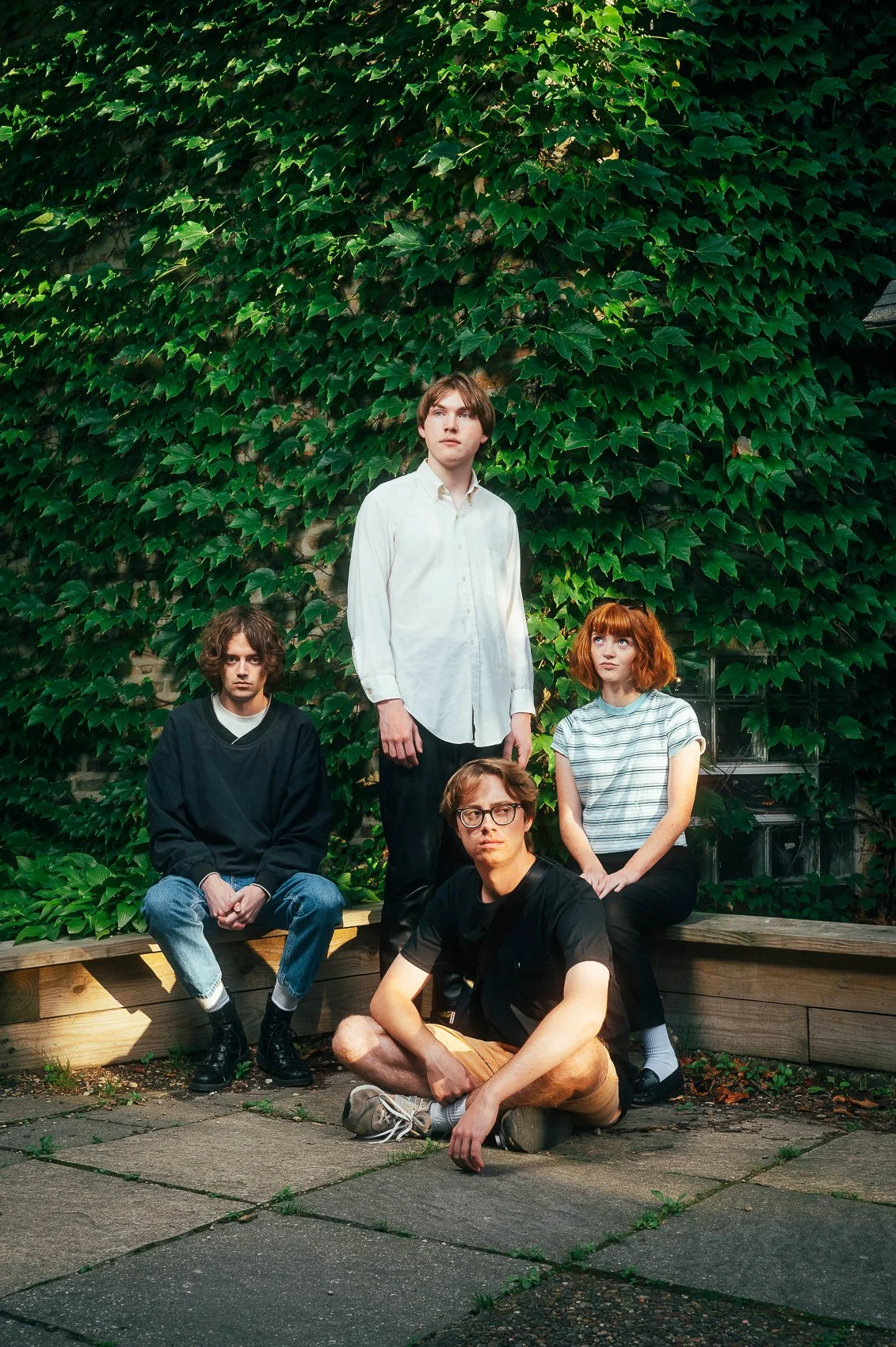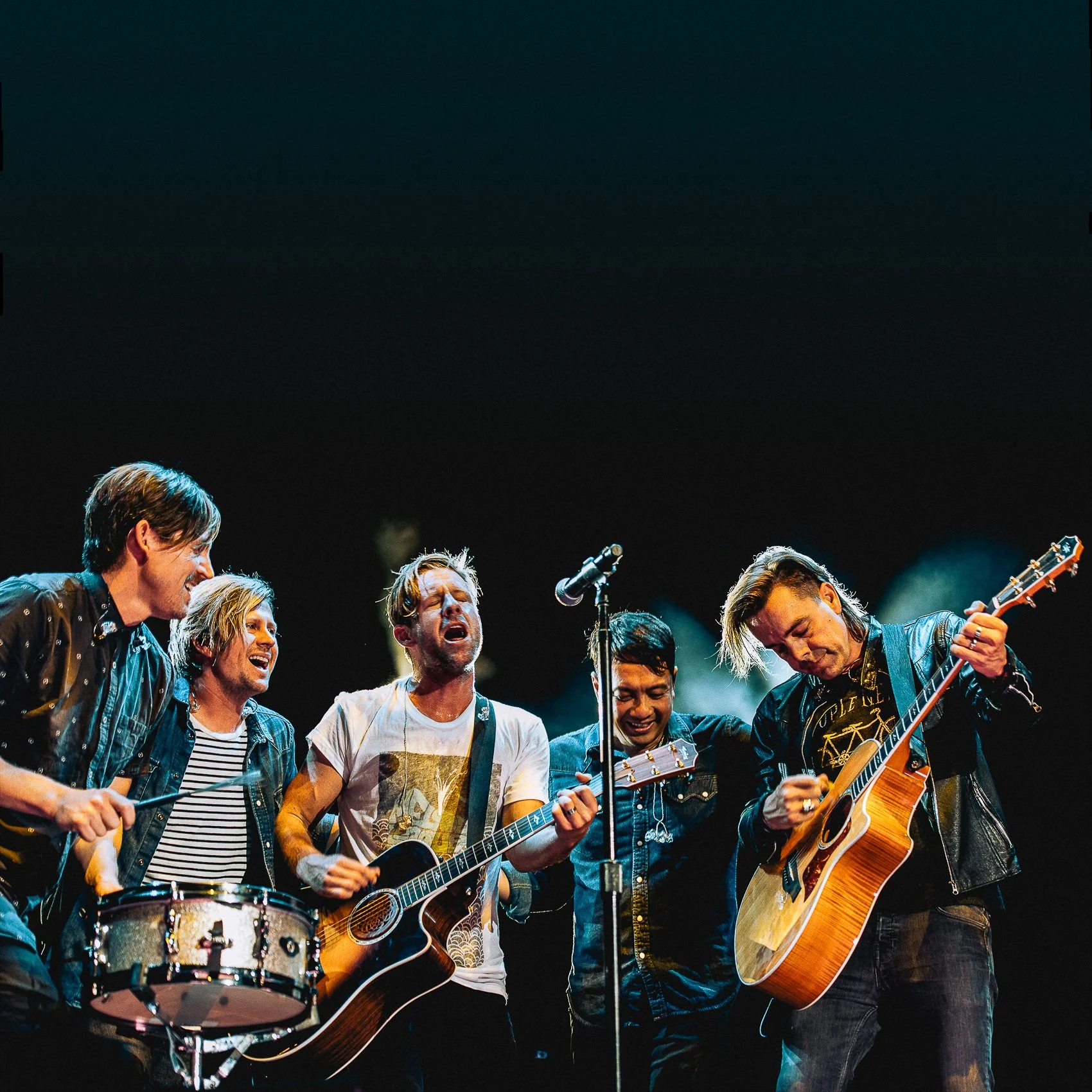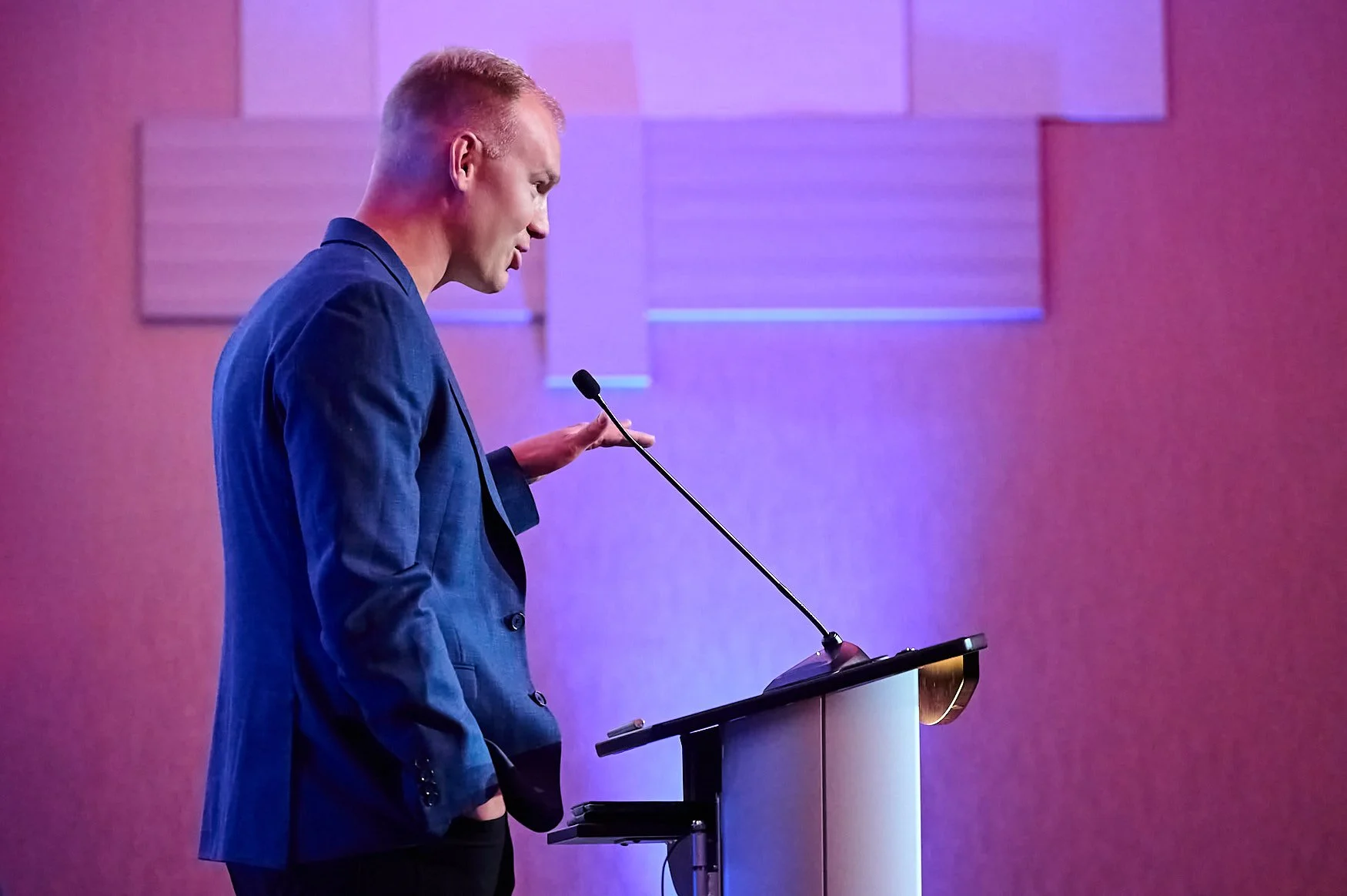Former Nikon USA Ambassador Chris Hershman sits down with Robert G Allen Photography for an interview about his photography journey and his departure from the Nikon Ambassador program
Search all Robert G Allen Photography articles:
All photos in this interview are copyright Chris Hershman
Shortly after noticing that Chris Hershman was no longer a Nikon Ambassador, I reported this on my site (read more here). Almost immediately, Chris reached out to me and wanted to provide more context to the situation. I reciprocated with an offer to be interviewed. I was interested in learning more about him and his photography journey and what may have led up to his separation from the ambassador program. He agreed to the interview and what follows are his responses to my questions.
B & W portrait of Chris Hershman by Alayna Peterson. Nikon Z6III with the Nikkor 24-70 f/2.8 lens.
RA: Give a general overview of your background and tell us how you entered the field of stills photography and eventually transitioned into video production.
CH: After high school, I considered studying photography. My parents bought me my first camera during my senior year, and I joined the yearbook club. I quickly fell in love with capturing still images. Instead of heading straight to college after graduation, I played music with friends and toured for a while, bringing my camera along to document the landscapes and our travels.
After a few years working in music retail sales, I decided to seriously pursue commercial photography. I called Calumet Photo to ask what camera and lens could deliver great results in low light, and that’s when I picked up the Nikon D300s—one of the first DSLR cameras with video capabilities—along with a 50mm f/1.4 lens. That single setup was all I used for nearly two years.
One day, I asked a client from the music store if I could film their band at a show. They agreed, and while shooting in the greenroom, I overheard them saying they wanted a video for one of their songs. I noticed the track on their printed set list and made sure to capture it from start to finish. Drawing from my musical background, I edited together clips from across the night to build a performance video that felt like it was filmed with multiple cameras, from both the audience and the stage.
The band ended up releasing it as their official music video, and soon after they were cast in a competition to appear on the cover of Rolling Stone. They didn’t win, but the video I made was featured on Rolling Stone’s website. That was the very first time I used my camera for film making, and it completely opened my eyes to what was possible. From that moment forward, I was hooked—and I’ve been creating films ever since.
Nikon D850 with the Nikkor 70-200mm f/2.8 lens
RA: You were a Nikon USA Ambassador, considered the pinnacle of achievement within the Nikon sphere. Please share all you can on what it was like to be a Nikon Ambassador.
CH: I was a Nikon Ambassador from 2018 to 2024, though my journey with the brand started much earlier. I wasn’t the typical ambassador—both in age and experience—but I had been proudly using Nikon cameras for my film making work since 2011. Early on, I shared my videos on Nikon’s Cinema Vimeo community page, which caught the attention of Scott Diussa, a local Nikon Field Rep. Scott reached out, and over time became both a mentor and a great friend. He championed my work internally at Nikon during a pivotal moment when the company, traditionally focused on photography, was adapting to the world of video.
Scott and I began collaborating on small shoots to build our skills with Nikon’s new video features. At the time, I was deeply embedded in Chicago’s music scene, so I constantly had opportunities to film live shows, promos, and music content. My biggest early project with Nikon came when I was asked to direct a large, multi-camera live performance video in a legendary Chicago studio. I didn’t have the gear to pull it off, so I turned to Scott. He proposed creating a behind-the-scenes video to complement the shoot, which he would film, while I wrote about my experience for Nikon’s blog. That project opened the door to more educational and aspirational content creation for the brand.
Few filmmakers were using Nikon for video back then, but I was making a full-time living with their gear and loved sharing that story. Nikon soon invited me to speak at NAB, where I presented my work and experiences from the field. That led to more speaking opportunities at CES, other conventions, and camera stores across the country. I’ve always had a natural enthusiasm for sharing my work and inspiring others, especially because I never had formal video training. I believe anyone determined to create can do it—they just need a little push, and I love being that push.
In 2018, I received the official invitation to join the Nikon Ambassador program. It felt like a natural step, as I’d already been collaborating closely with the company for years. The role came with annual meetings at Nikon headquarters, early access to gear, and plenty of teaching opportunities.
Nikon Z6III with the Nikkor 70-200mm f/2.8 lens.
RA: What were the circumstances that ended with you leaving the Ambassador program?
CH: In 2020 the pandemic hit. Everything moved online, and in-person events disappeared. Like many creators, I had to pivot. I accepted the position as a video director at a music retail company, leading a team of over ten. The company primarily used Canon gear, which meant I wasn’t producing new Nikon-based content or educational material. Over time, it became clear that the industry was shifting toward online creators and YouTube reviewers rather than traditional ambassadors—not just at Nikon, but across the board.
By 2024, I was fully focused on my in-house work and less on creating content for public sharing. When Nikon decided not to renew my ambassador agreement, I felt nothing but gratitude. I’m proud of that chapter—it was a major milestone, filled with friendships, opportunities, and growth. While my current focus is on high-level production and directing rather than teaching, I haven’t closed the door on sharing and education in the future. The program was a meaningful part of my journey, and I’ll always be thankful for it.
Nikon Z50 with the Nikkor Nikon 70-200mm f/2.8 lens.
RA: Are you still shooting with Nikon equipment? Do you use other brands of cameras and lenses now that you are no longer with Nikon?
CH: For stills on professional jobs, I'm using the Nikon Z6III and Z8 with all my pro S-Line Glass. Just this year I've experimented with pairing Fuji Medium format and APS-C cameras as an alternative look.
For recreation, I've been using a Fujifilm X100VI as a lightweight, take with me everywhere option. I had the Nikon Zf and wanted to see how this compared. So far, I miss the Nikon. At first, the Zf felt too similar to the rest of the Nikon lineup to feel like a novelty travel camera, however, I miss its familiarity, speed and performance. I'll be selling the Fuji soon, but I'm trying everything I can to fall in love with it.
For professional video, I've been using the Nikon Z6III for gigs that require a small and portable setup. For larger productions, I use the Sony FX6 paired with a FX3 for b-cam. The Sony lineup has the reliability, flexibility and functionality to meet my most demanding needs on set. It's lightweight but has so many features that make it amazing for professional use.
No, I haven't used the new Nikon Zr yet. I could see it being an excellent gimbal camera. The large screen would prevent the need for a monitor, and the internal RAW capabilities make it an excellent choice for minimal setup with powerful deliverables.
Nikon Z6III with the Nikkor Nikon 40mm f/2 lens.
RA: During your period as a Nikon Ambassador, were you allowed to use other brands of cameras or lenses or were you restricted to using Nikon only?
CH: I was allowed to use any and all equipment, but I was just not able to endorse them in an official capacity. Nikon is very understanding that our clients may have specific requests that may require tools that Nikon doesn't offer. No need to restrict our use of visual tools.
Nikon Zf with the Nikkor 105mm f/2.8 macro lens.
RA: When you were retained by Nikon to create content to promote their products, were you compensated for these assignments?
CH: NDA's and other various agreements I've signed prevent me from speaking about compensation or anything monetarily related to the Ambassador program.
RA: What is your current situation, are you working full time in content creation or do you have a day job to supplement your income?
CH: Living in Nashville has enabled me to provide visuals to the music industry and the tourism and event space. I work within Concord Music Group that owns many record labels. I'm a Creative Content Manager. I manage video production, editing and any other visual needs for any and all of the record labels under the Concord umbrella.
In addition to Concord, I travel with various music artists when my schedule allows. Work is different every day and that's what I've enjoyed most about my time in Nashville – heaps of opportunity.
Nikon Z8 with the Nikkor 40mm f/2 lens.
RA: Other than cameras and lenses, what else do you pack in your camera bag for an assignment?
CH: I try not to switch up my cameras and lenses as often as possible without limiting myself. I'm a firm believer that each gig is the opportunity to learn something new. That being said, If I'm going to try a new camera system, I need to make one of my two camera systems, something that I know and trust – never miss the shot(s) you were paid to capture but try to add value by bringing something new to the table. That's why I started bringing a Fujifilm around when I could.
For gigs that required more post production and possible compositing, I tried the medium format. It slowed me down but gave me some unique looks and flexibility that I needed in post.
For gigs that had extremely quick turnaround and nonexistent post production budget, I tried the Fujifilm APSC Cameras. Again, it’s a bit slow but very fun looks.
I have several camera bags next to the door that are packed and ready for each occasion. But the ones that leave the house the most often, is the Nikon kit.
Nikon Z6III with the Nikkor Nikon 24-70 f/2.8 lens.
RA: Where do you see your future going as it relates to still photography? Will you concentrate more on video or still do some stills photography?
CH: As of now, I've re committed to posting a photo to social media each day. Preferably one that I took the day before. This has forced me to keep photography a priority since most of my jobs have become video-based at the moment.
I like trying new gear and giving myself new tasks. And just because I'm not connecting with gear immediately, doesn't mean that it will prevent me from creating excellent images. Gear is both a tool for work, but a toy for pleasure.
I find my greatest enjoyment within still photography to be flash photography on-location or in the studio. Giving the camera ample light to use it within its maximum performance typically yields amazing results. This is also where I get full control of my light source and I really enjoy shaping and using light to help create specific moods. When I have full control, that's when I feel like I'm "creating" instead of just capturing. I have a need to create – it sets me free and pushes me to go beyond what I thought I was capable of within the medium of visual art.
Nikon D750 with the Nikkor 58mm f/1.4 lens.
RA: In closing, is there anything else you would like our audience to know?
CH: There are many ways to capture a single image, or capture video. All these tools are here to help and its important to understand that one is not better than the other, as much as they lend a new flavor to the dish you're cooking up. My time as a Nikon Ambassador was a wonderful opportunity to meet the greater visual arts community and be part of the larger discussion, which is making visual art for a living. I hope if you're reading this, you continue to push yourself, your art further than you ever have before. Use gear as an inspiration, not a badge of honor. Although, if you have the funds, by all means, collect them all.
I've been behind the camera since high school. I hope to be behind the camera until my hands can no longer hold tight to a camera body. But one thing I hope you never do is compare your journey or success to others. Comparison robs joy. This life, this journey is meant to be enjoyed to the best of our ability, so if a camera is your tool, build something you really love, but build it for you and you alone.
To learn more about Chris, visit his website at https://chrishershman.com/
All photos in this interview are copyright Chris Hershman
Nikon Z6 II with the Nikkor 40mm f/2 lens.
Nikon D810 with the Nikkor 24-70mm f/2.8 lens.


























2025 was a year in contrasts. On one hand, I had a banner year with my event photography business. My gross sales and the number of events has never been higher. So, good news on the business side of things which I’m grateful for. On the other hand, due to the success of my business, it left little time for my general photography interests which is what I showcase blog about on this site